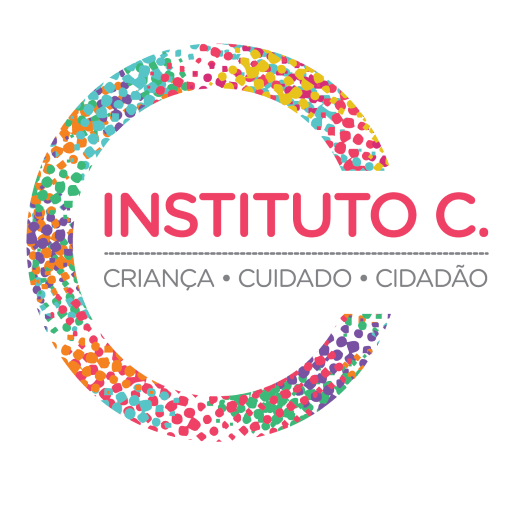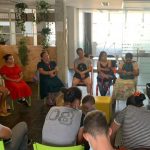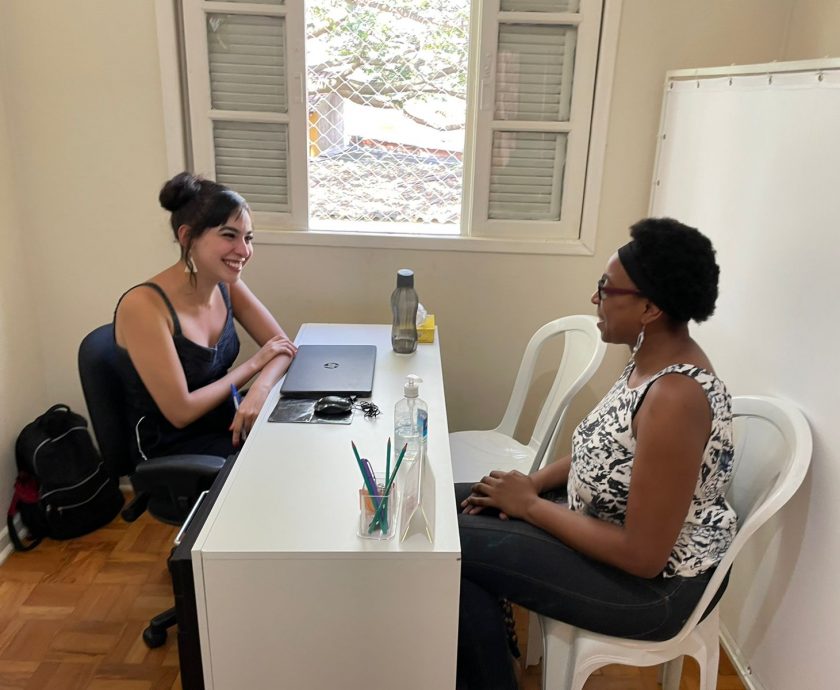The conversation circles, one of the key activities offered by Instituto C to families, are far more than simple group meetings. They act as powerful spaces for integration, fostering authentic connections, active listening, and the enriching exchange of knowledge and experiences.
Through these meaningful dialogues, families learn about important issues and strengthen their community bonds—creating an environment of support, learning, and mutual care.
In this article, you’ll better understand how conversation circles work at the Central Hub and North Zone Hub, the methodology used by Instituto C, and the importance of these moments for each family that participates.
Conversation Circles: Why and How Do They Happen?
Instituto C’s headquarters is located at the Central Hub, where the Family Action Plan is carried out—this was the organization’s first project and the foundation for testing and developing its current care methodology.
At the Central Hub, conversation circles occur every two months and are part of the family care plan. They follow a structured schedule: one month is dedicated to individual sessions with case managers, and the following month, the conversation circle takes place, followed by multidisciplinary services. “We have a planned calendar with six main topics we discuss throughout the year. Families are divided into groups to ensure everyone’s inclusion, and for about an hour, they participate in the discussions,” explains Katia Moretti, coordinator of the Central Hub.
In contrast, the North Zone Hub, launched in March 2022, is where the Cidadania em Rede project is implemented—a comprehensive initiative that brings together Instituto C’s expertise to serve families in vulnerable situations with children and adolescents from surrounding communities.
There, conversation circles are held weekly, with a new topic each week. Unlike the Central Hub, where topics are repeated, the North Zone features a constant variety of themes. In addition to individual services, families have a group session every Monday afternoon. Topics are chosen based on case managers’ observations during individual meetings, recurring needs, or relevant events such as Yellow September (a suicide prevention campaign).
“Each week, a different case manager leads the circle. Two professionals are involved: one chooses the topic and leads the discussion, while the other supports the logistics and setup. The leading professional can facilitate the session themselves or invite a guest expert,” says Talita Lima, coordinator of the North Zone Hub.
The Impact of Conversation Circles
The conversation circles are carefully prepared by Instituto C’s professionals, who identify shared concerns among families and conduct research to enhance the discussions. The aim is to create a collaborative learning environment, not just a lecture format. Dynamic activities encourage active participation, inviting families to share their own stories and insights.
The impact is clear in family evaluations. “The average satisfaction score is extremely high—9.95 out of 10—and all families strongly agree that the sessions help them deal with unfamiliar topics,” says Katia.
“I received valuable, up-to-date information I had never accessed before,” shared Fernanda Lima Zerbatto de Lucena, a participant at the Central Hub.
At the North Zone Hub, although all families are invited, sessions occur outside regular service hours and are scheduled alongside case review and home visits. “We’ve noticed that attendance varies and is usually lower compared to the total number of families served. However, topics that deeply resonate—such as autism or child development—often draw a larger audience,” explains Talita.
There, topics are announced in advance, allowing families to choose the sessions most relevant to them. “This results in more engaged participation. Even if the number is smaller, those who attend are genuinely interested,” Talita adds.
In 2023, 87% of families at the North Zone Hub rated the circles as excellent. “It was very helpful to reflect on some of my parenting habits—what I need to improve, how far I’ve come, and how important it is to raise children with both firmness and empathy,” shared Laize O. C. Santana, one of the mothers served by Instituto C.
Another participant, Nathalia Stephanie Felix de Morais, highlighted the importance of connection: “This meeting allowed me to express myself and listen to others who are going through—or have gone through—similar challenges.”
Topics Covered in Conversation Circles
At the Central Hub in 2023, the topics were:
-
Ableism
-
Violence against women
-
The importance of play
-
Home gardening
-
Identity and representation
-
Life planning and goal setting
Among these, Katia highlights ableism and the importance of play as especially powerful conversations that helped demystify common misconceptions. “Connecting with the stories, struggles, and victories of other families builds a sense of community and mutual support,” she emphasizes.
“I learned a lot from this conversation circle. I had heard about the importance of play from other professionals, but today I really understood. The way it was explained opened my eyes. From now on, I’ll see my son’s therapy with a different perspective,” shared Katiane de Fátima da Silva, reflecting on the circle about the importance of play.
At the North Zone Hub, Talita points out highlights like the circle on autism, which included a neuro-educator and drew great interest. Other impactful sessions covered women’s health and female sexuality, which sparked both curiosity and important conversations about often-taboo topics. “We conduct evaluations after each circle, giving families the opportunity to provide feedback and suggestions. Overall, the responses are positive. Families recognize that they’re not alone—and that shared experience fosters connection,” Talita concludes.
More Than Just a Meeting
In this way, it’s clear that Instituto C’s conversation circles are far more than casual gatherings—they are powerful spaces of connection, growth, and support. Whether at the Central Hub or the North Zone Hub, these sessions offer families the opportunity to reflect on relevant issues while being seen, heard, and embraced as part of a caring community. The active participation of families, even when dealing with difficult or sensitive subjects, highlights just how essential and impactful these moments are for well-being and holistic development—for everyone involved.



